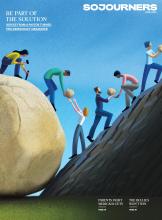These days, I’m finding it increasingly challenging to make it to Wordle or the mini puzzle without being emotionally activated by at least five headlines along the way. I know I am not alone.
Our country is in a precarious political moment. Every headline seems to be filled with the threat of President Donald Trump’s impact and intentions: This acknowledges the far-reaching, ominous, and almost omnipresent force that is our current administration.
I haven’t felt this overwhelmed since I had to shelter in place during the covid-19 pandemic. Yet somehow, it feels different this time. Back then, the foundations of our democratic republic were not threatened with such clear intent — except, of course, for that insurrection on Jan. 6, 2021. But now, the future seems even more perilous and uncertain. And that’s a valid reason to feel overwhelmed.
Making people feel overwhelmed is part of the authoritarian playbook. At its core, it is about exercising control over bodies; monitoring movement and expression; and fostering restlessness, worry, and numbness. In these times, prayerful discernment can be one of our tools for tuning in and identifying these powers and systems that theologian Walter Wink described as creating the “suffocating atmosphere of the present.”
Read the Full Article

